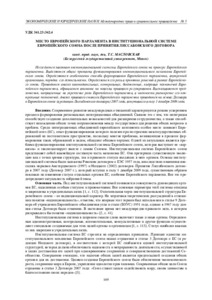Please use this identifier to cite or link to this item:
https://elib.psu.by/handle/123456789/13084Full metadata record
| DC Field | Value | Language |
|---|---|---|
| dc.contributor.author | Масловская, Т. С. | - |
| dc.date.accessioned | 2015-07-02T10:31:17Z | - |
| dc.date.available | 2015-07-02T10:31:17Z | - |
| dc.date.issued | 2015 | - |
| dc.identifier.citation | Вестник Полоцкого государственного университета. Серия D, Экономические и юридические науки. - 2015. - № 5. – С. 169-173. | ru_RU |
| dc.identifier.issn | 2070-1632 | - |
| dc.identifier.uri | https://elib.psu.by/handle/123456789/13084 | - |
| dc.description | Position of the European Parliament in the Institutional System of the European Union After the Adoption of the Lisbon Treaty. T. Maslovskaya | ru_RU |
| dc.description.abstract | Исследуется эволюция институциональной системы Европейского союза на примере Европейского парламента. Выделяются общие принципы функционирования институционального механизма Европейского союза. Определяются особенности способа формирования Европейского парламента, внутренней организации, порядка его деятельности. Определяется его роль в принятии решений в рамках Европейского союза. Проводится анализ законодательных, контрольных, бюджетных, кадровых полномочий Европейского парламента, обращается внимание на новеллы правового регулирования. Высказываются предложения, направленные на укрепление роли Европейского парламента, в частности расширение его контрольных полномочий. Анализ правового статуса Европейского парламента проводится на основе Договора о Европейском союзе (в редакции Лиссабонского договора) 2007 года, вступившего в силу 1 декабря 2009 года.= The article explores the evolution of the institutional system of the European Union on the example of the European Parliament. There are some common principles of functioning of the institutional mechanism of the European Union. Determined by the particular method of forming the European Parliament, the internal organization, about its activities. Determined by its role in decision-making within the European union. The analysis of legislative, control, budgetary, personnel authority to the European Parliament draws attention to the novel legal regulation. Suggestions have been made to strengthen the role of the European Parliament, in particular, the expansion of its supervisory powers. Analysis of the legal status of the European Parliament is based on the Treaty on European Union (as amended by the Treaty of Lisbon), 2007, entered into force on December 1, 2009. | ru_RU |
| dc.language.iso | ru | ru_RU |
| dc.publisher | Полоцкий государственный университет | ru_RU |
| dc.relation.ispartof | Веснік Полацкага дзяржаўнага ўніверсітэта. Серыя D, Эканамічныя і юрыдычныя навукі | be_BE |
| dc.relation.ispartof | Herald of Polotsk State University. Series D, Economics and law sciences | en_EN |
| dc.relation.ispartof | Вестник Полоцкого государственного университета. Серия D, Экономические и юридические науки | ru_RU |
| dc.relation.ispartofseries | Серия D, Экономические и юридические науки;2015. - № 5 | - |
| dc.rights | open access | ru_RU |
| dc.subject | Международное право | ru_RU |
| dc.subject | Европейский парламент | ru_RU |
| dc.subject | контрольные полномочия | ru_RU |
| dc.subject | Европейский союз | ru_RU |
| dc.subject | Лиссабонский договор 2007 г. | ru_RU |
| dc.subject | Договор о Европейском союзе | ru_RU |
| dc.title | Место Европейского парламента в институциональной системе Европейского союза после принятия Лиссабонского договора | ru_RU |
| dc.type | Article | ru_RU |
| Appears in Collections: | 2015, № 5 | |
Files in This Item:
| File | Description | Size | Format | |
|---|---|---|---|---|
| 169-173.pdf | 152.74 kB | Adobe PDF |  View/Open |
Items in DSpace are protected by copyright, with all rights reserved, unless otherwise indicated.